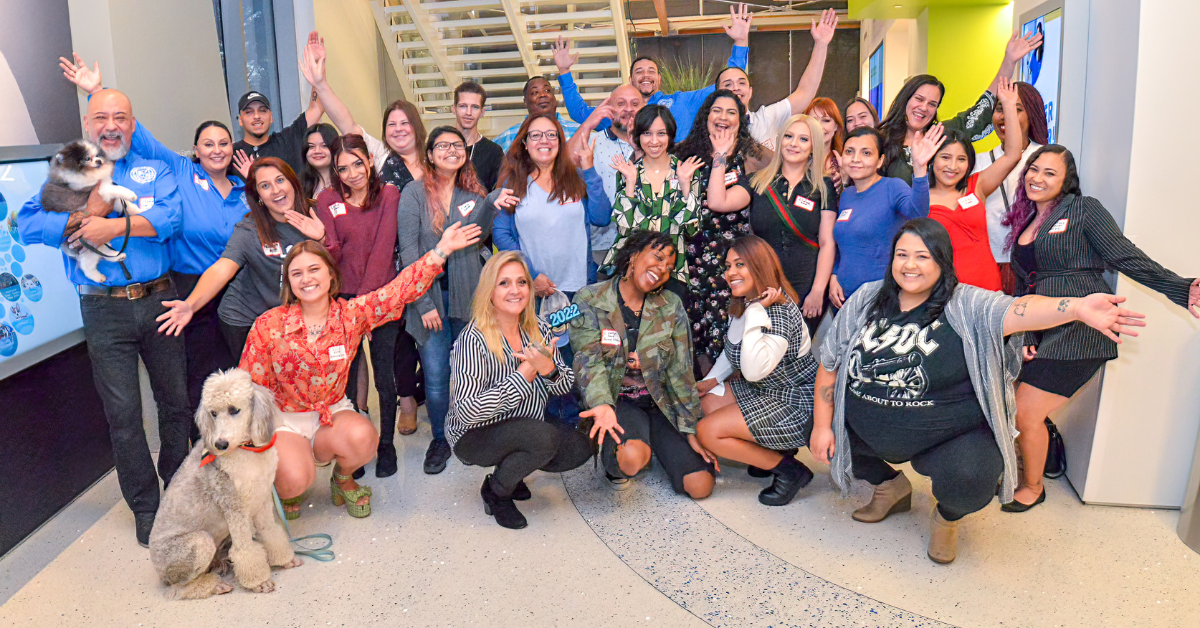What’s one of the best ways to support animals? Turns out, the answer, often, is to support humans.
Michelson Institute for Pet Professions, under the inspiring leadership of Heather Thomas, invests in the education of people with a desire to work in animal welfare.
By Siobhan Brier
Michelson Found Animals has always championed pets at every point they intersect with society. During the pandemic, it became clear that in order to continue to help pets and keep animals out of the shelter, we needed to support both ends of the leash. That, combined with a need to create a pipeline of pet care providers by increasing diversity and lived experiences in animal welfare, MIPP was born.
This philosophy is why we started MIPP, or the Michelson Institute for Pet Professions, spearheaded by the dedicated and enthusiastic Heather Thomas.
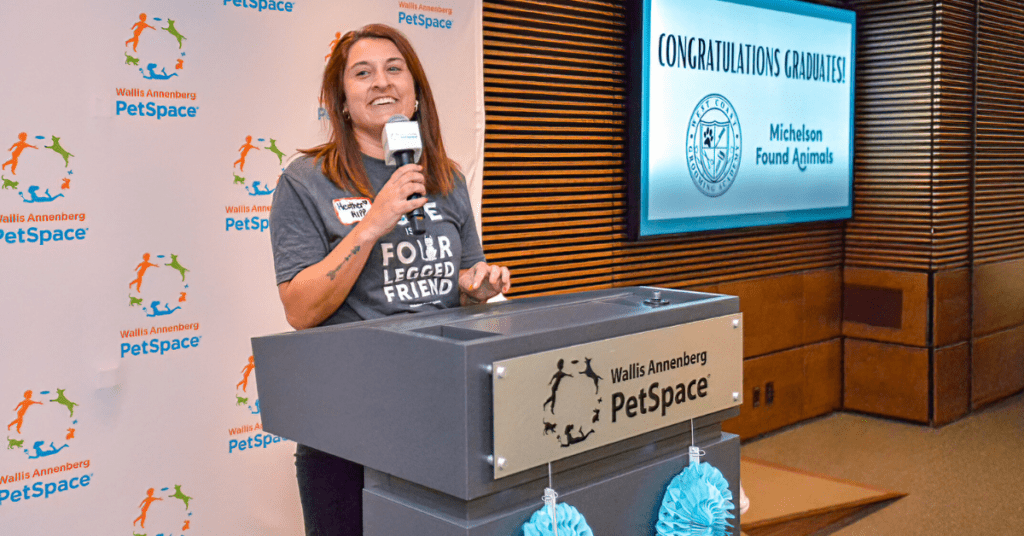
Heather Thomas, speaking at the Michelson Institute for Pet Professions graduation ceremony.
“I realized, oh, giving back is part of who I am, not just a side interest.”
Originally from Cleveland, Heather attended Kent State University to study public relations and marketing. After graduation, she moved to Los Angeles and worked for years at a PR firm. But in the early 2010s, PR was changing rapidly, and Heather started to pursue other interests outside of work. She spent her free time volunteering for WriteGirl, a mentorship nonprofit that uses writing as a tool to empower and encourage young women. She always knew that volunteering and helping others was one of her main interests, but it was around this time that she realized: “Oh, giving back is part of who I am, not just a side interest.”
So, she applied to work with Michelson Found Animals in 2017 and started a position as a volunteer coordinator, then moving into a Program Manager role. She ensured that volunteers had support and a positive experience, and she also helped the Kitten Nursery at Adopt & Shop, which sent cats and kittens to foster homes before being adopted. She grew up helping out at an animal shelter, which her best friend’s mom managed, and has always been a pet lover, even adopting three cats in college. “Two of them have since passed,” she said, “but I still have one twelve-year-old cat, Nya, or Noodle as I call her, and that’s my child, my baby.”
“If more people are supported, then fewer pets will end up in shelters”
Pre-pandemic, there was already a staff shortage in animal welfare, and the pandemic made things significantly worse, with one survey finding that nearly 90% of shelters have fewer staff and volunteers than before. As a result, Michelson Found Animals made the decision to sunset the Adopt and Shop program and switch gears in 2021.
“The organization decided to focus on supporting people who own pets in our communities,” Heather said. “Because if more people are supported, then fewer pets will end up in shelters.” At that time, Michelson Found Animals started the Michelson Institute for Pet Professions (MIPP), with Heather as its very first Program Manager.
How MIPP Helps Businesses, People, and Animals
The goal of MIPP is to offer training, certification, and job placement in pet grooming careers for animal lovers from underrepresented communities in Los Angeles. This goal offers the two-fold benefit of contributing qualified workers to a field with significant staff shortages and also helping people who are interested in working with animals have the chance to do so without worrying about the financial burden that comes with training and tools.
Especially for people who love animals, a career in dog grooming can be attractive. It offers an exciting opportunity to create autonomy in their work, even start their own business, and it can become a lucrative and fulfilling career working hands-on with pets. Dog grooming certification is also just three months of training, and it isn’t a highly medically-focused job like many animal care positions.
Beyond the financial support, there is a personal component as well. “Working with animals provides a lot of rewarding benefits,” Heather shared. “Much of this program involves emotional payments. There’s a reward you get for helping animals in need.”
That said, people interested in pet grooming face a few hurdles. Grooming training certification programs can cost around $7,000, and all the necessary tools can cost $1,000 or more. Just these price tags alone can eliminate qualified and passionate people from the applicant pool before they even get the chance to start.
MIPP pairs with organizations that offer resources to groups that are often underrepresented in pet care fields and beyond. Partners include the Los Angeles LGBT Center, organizations for individuals facing homelessness, programs for people who are justice-system impacted, and more. If selected, applicants then receive dog grooming training and certification at West Coast Grooming Academy, their own kit of supplies provided by MIPP, guidance, and job placement support in grooming salons.
As the program manager, Heather has already seen more than 100 people graduate. She personally recruits, selects, supports, and coaches everyone involved in the program. So, what does she look for in an applicant? “Being an animal lover is important, but also having an understanding of animals as beings who need our support rather than just something cute, like a toy or an accessory. It’s more about hearing people say, ‘I like pets, and I want to make their lives better.’”
Making a Personal Connection
Heather doesn’t take a distant approach to her leadership role with MIPP. She gets to know the people involved in the program and sees their journey through from application to job placement.
“These people are facing some very serious barriers,” Heather admitted. But even faced with systemic and intimidating challenges, Heather works side-by-side with the people in the program to ensure they have what they need to make it to graduation.
One program participant, Arlecia, learned a bit about dog training while incarcerated, then found out about MIPP through the A New Way of Life organization. Arlecia was dedicated and serious about the chance to give something back to animals in need, but she had issues with transportation to get to class. So Heather, through MIPP, ensured that Arlecia had Metro rides and then gas cards once she got a car. Arlecia was able to graduate in March and is starting her career as a groomer.
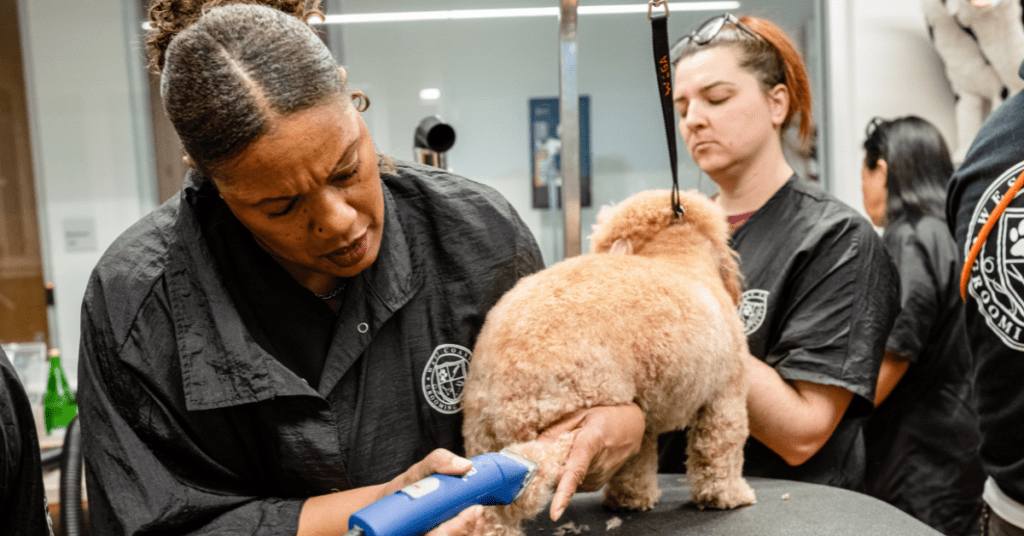
Arlecia and fellow MIPP classmate grooming a poodle.
Heather shared that one of the most exciting things about the work is seeing how people change from the beginning of the program to the end. She recalled one student who was incredibly shy and didn’t feel proud of his story or his work. But with encouragement from the instructors and Heather, he started to open up. By the end of the course, this student seemed like an entirely different person. He was confident, outspoken, and committed. Heather pointed out that some people are deterred from the program by their own mental hurdles; they think that they won’t be able to complete the 12 weeks or aren’t good enough. But as the course goes on and they learn more, and with support from their instructors and Heather, many people see what they are capable of, and they gain new aspirations, like career growth and business ownership.
This pride comes, in part, because grooming goes beyond just the aesthetic look of the dog. “It’s really about supporting the overall health of the dog,” Heather pointed out, “not just the look. For example, it hurts them when their nails are too long. Grooming can really help keep a dog healthy.”
While in training, students get to work at Annenberg PetSpace, grooming pets who are adoptable and, thus, helping them look and feel their best for their forever home. Petspace animals are just some of the pets who wound up without a home, and through the care of the MIPP program participants, they get a second (or first!) chance at having a loving family.
“I want to see more success stories.”
As for the short-term goals for MIPP, Heather knows what she’s going for. “I want all of the students to graduate,” Heather says. “And we want to continue to bring on students who are super deserving of the opportunity. I want to see more success stories.”
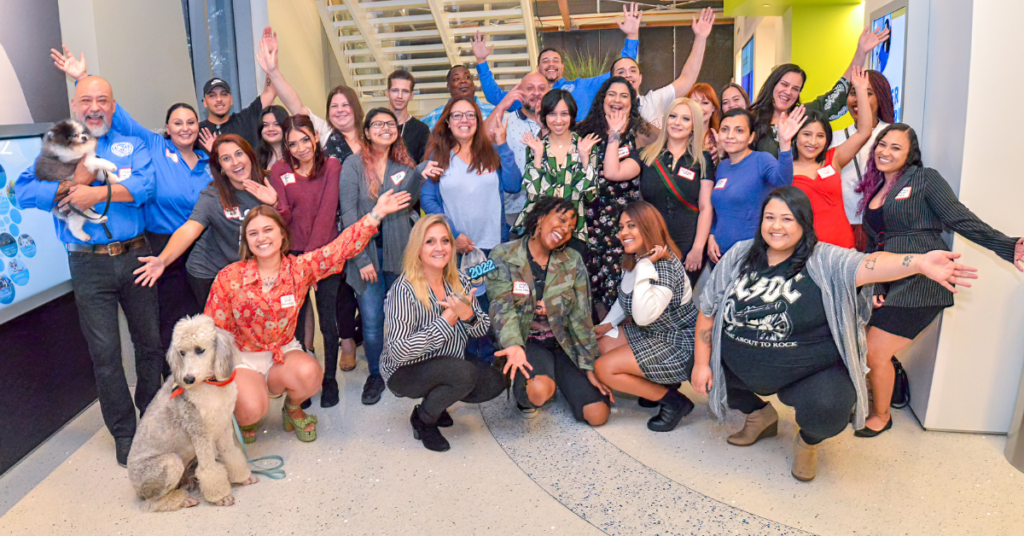
Heather, West Coast Grooming Academy staff, and 2022 MIPP graduates at Annenberg Petspace.
Long term, she wants to continue to grow with Michelson Found Animals because she still sees a lot of need in the animal welfare space, and she wants to keep addressing that need through her work. She would also like to find ways to incorporate mental health care into animal welfare jobs. “The animal welfare world is in a tough spot right now, and I would like to see more mental health support across the board.” She recommends finding time for self-care, which, for her, looks like little pleasures like yoga, hiking, concerts, and hanging out at home with her best friend (Noodle).
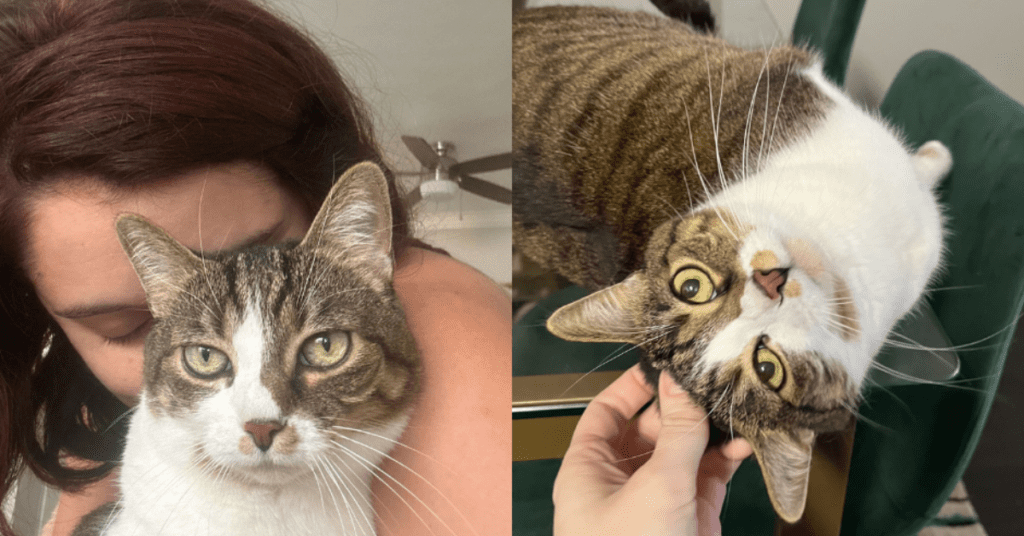
Heather and her best-friend Noodle.
“Stay dedicated and committed and see it through.”
Despite the challenges that come with working with pets, Heather encourages people to try out this career, stick with it, and find ways to adapt within the field.
“Start as a volunteer and get an idea of what everyone in a shelter does at their job,” Heather advises people who are interested in working with animals. “Get an idea of different careers within the industry and see which one feels like the best fit. Try not to get defeated, even if it’s not exactly what you expected right off the bat. There are ways to get involved in this industry; if just one part of it isn’t for you, then there are still a lot of other options and ways to work.”
Overall, the pet care industry needs help right now. But Heather and MIPP have found a way to give a boost to qualified and eager people who are able to offer that aid to pets and the industry as a whole. This philosophy can be applied to people as well: if you are in a tough spot right now, those challenges don’t define you as a person, and they certainly don’t have to define your future. Through MIPP, you can not only benefit your career outcome but also benefit the lives of animals and the community that cares for them.
Interested in the Michelson Institute for Pet Professions? You can apply for MIPP here or learn more about how Michelson Found Animals shows its dedication to pets and pet owners here.
Get the latest news from Michelson Philanthropies. Sign up for our newsletter today!



